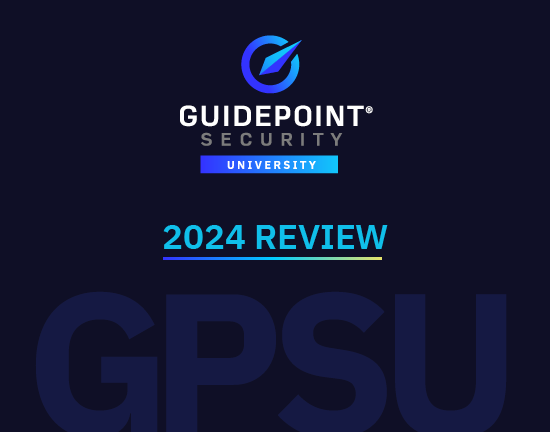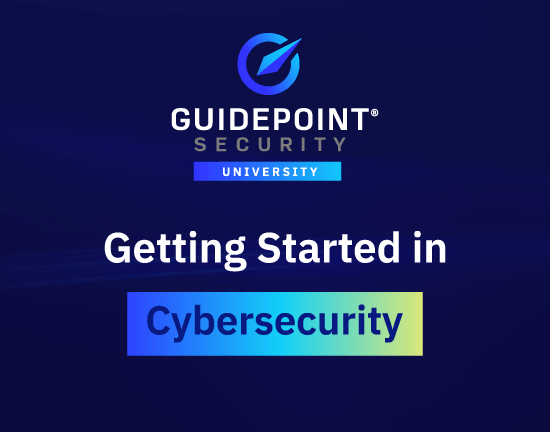
Start or extend your cybersecurity career with a training program built by experienced practitioners.
GPSU Overview
Despite increased investment in cybersecurity, commercial and government organizations continue to face a massive skills shortage due to heavier workloads, unfilled positions and worker burnout.*
GuidePoint Security University (GPSU) is a training and development pipeline to help those interested in a cybersecurity career develop critical industry skills and apply cyber knowledge to develop real-world solutions. GPSU has an internship component, which is tailored to create an individualized experience based on your background and aptitude that teaches both technical and soft skills.
* The Life and Times of Cybersecurity Professionals 2021, ISSA and ESG
Is GPSU Right for You?
Whether you are new to cybersecurity or have a background in IT, GPSU is designed to help you begin or enhance your cybersecurity career.
Transitioning from Active Duty Military?
We are authorized to conduct SkillBridge, Career Skills Program and Hiring Our Heroes internships.
Learn more about our DoD internships by contacting the team at [email protected].
- Have a Clearance and New to Cyber? Many cyber professionals begin as a SOC Analyst in a cleared space, monitoring networks to identify incidents and responding to alerts from across the organization.
- Background in IT Administration? Consider Cloud Security or Identity Management to utilize your understanding of network architectures and authentication processes.
- Recent Software Engineering or Computer Science Graduate? Use your understanding of underlying code to shift into Application Security and help identify vulnerabilities. If you enjoy creating solutions and know how to write in python, a career in Security Orchestration, Automation and Response (SOAR) may be for you.
- Prior Technical Leadership Roles? Explore becoming a project manager, where you can work with various departments throughout the organization, while using a variety of collaboration tools and techniques to drive operations.
- Transitioning from Business or Military Intelligence? Leverage your skills to become a member of the Data Analytics team, which uses analytics to prevent and detect threats.
The 2024 GuidePoint Security University Annual Report highlights another year of impactful growth in cybersecurity education. This edition features the GPSU internship program’s continued success, spotlights stories from standout interns and showcases how the program is shaping the next generation of cyber professionals. Click the Report cover to read more.
Benefits of Conducting a GPSU Internship
- Option to work 100% remotely or on-site at several US locations
- Flexible internship length that works with your timeline (2-6 months)
- Training labs and courses all provided at no cost to you
- Work with industry-leading experts who previously managed security within the DOD, intelligence agencies and Fortune 500 companies
- Chance to earn industry certifications and Continuing Education Units
- Guaranteed interview for a position at GuidePoint Security upon successful completion of any internship
Getting Started in Cybersecurity
Oftentimes, we see two areas where people struggle when it comes to landing your first cybersecurity job:
- It can be difficult to wade through the myriad of resources available and come up with an effective plan.
- It can also be frustrating applying to hundreds of jobs and hearing nothing back.
This ebook, written by our Director of GuidePoint Security University, is created for the sole purpose of helping you better understand what hiring managers are looking for and equipping you with a training plan that establishes the foundational industry knowledge needed to begin your career in cybersecurity.
GPS University:
A Community Designed
to Support + Inspire You
We shine a spotlight on GuidePoint Security University’s [GPSU] transformative impact on helping to fill the cybersecurity talent gap. Led by our GPSU Director Kevin Woods, this narrative showcases the journeys of several remarkable students, exemplifying how GPS University propels them towards success in their IT Security field of choice and empowers them to shape a brighter future for themselves + the world around us.
GPSU Technical Focus Areas
Application Delivery
A combination of services that work together to provide a functional and secure application – spanning from end user interactions through data processing to where the data is stored.
Network Security
The network security team helps ensure the integrity and security of physical and virtual networks, by evaluating and administering devices, such as firewalls and other network access controls.
Application Security
Application Security engineers review underlying code and test live applications to identify vulnerabilities that a threat could exploit. Members of the application security team often work in tandem with other technical specialties, such as penetration testers, to provide a more holistic approach to proactive security.
Penetration Testing
This offensive aspect of security proactively tests networks, devices and applications for vulnerabilities that a threat could exploit to steal information or cause damage to an organization. Pentests often conclude with a detailed description of an organization’s overall security posture, along with suggestions to mitigate cyber risk.
Cloud Security
Cloud Security professionals enable organizations to secure their Amazon Web Services, Microsoft Azure and Google Cloud Platform environments. Cloud security covers many aspects of cybersecurity security: operations, administration, compliance and architecture.
Project Management
Help drive all operations and ensure cybersecurity projects are seen through to completion. PMs are involved in all disciplines covered by GuidePoint Security.
Governance, Risk and Compliance (GRC)
GRC professionals review and manage the processes, roles, controls and metrics of handling information – while also ensuring that organizations understand relevant laws, regulations and their current risk and compliance posture.
Security Operations
The Security Operations Center (SOC) is where security professionals monitor network traffic and respond to potential cyber threats early within the threat lifecycle. Security analysts review alerts in real time to identify abnormal activity requiring further review by a technical expert.
Identity & Access Management
A framework for managing digital identities and controlling user access to critical information and systems without impeding business operations. Privileged Access Management (PAM) oversees the technologies that exert control over account privileges and elevated access levels across the network. Identity Governance and Administration (IGA) enables administrators and security teams to manage and reduce risk related to unnecessary user access levels.
Security Analytics & Automation
An approach where data is analyzed to produce proactive security measures. Organizations often use Security Information and Event Management (SIEM) platforms to collect and analyze data from multiple sources in order to detect threats, ensure compliance and manage incidents. Security Orchestration, Automation & Response (SOAR) technologies are used to ingest data and automate security tasks through playbooks that integrate various products and application mechanisms.
GPSU Next Steps
Apply for an Internship! See available internships on our Careers Page.
Want More Information? Please contact [email protected]

